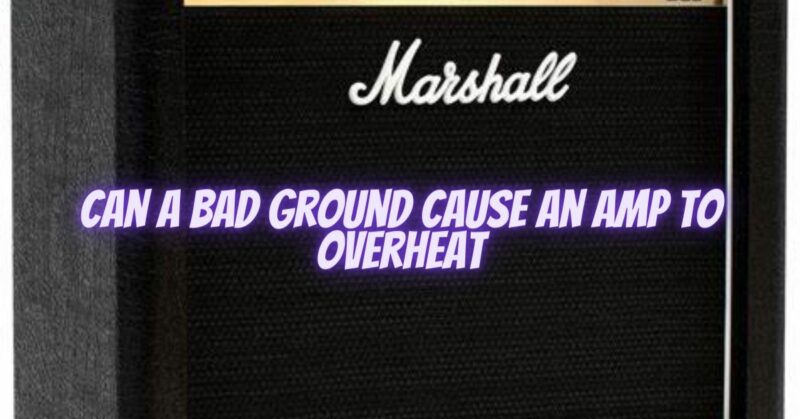Amplifier overheating can be a frustrating and potentially damaging problem for guitarists and musicians. While there are various factors that can contribute to overheating, one often overlooked culprit is a bad ground connection. In this article, we will delve into the relationship between a bad ground and amplifier overheating, helping you understand the impact and potential solutions.
Understanding Grounding in Amplifiers: Grounding is a fundamental aspect of electrical systems, including guitar amplifiers. A proper ground connection ensures the safe and efficient flow of electrical current, while also serving as a reference point for voltage. In amplifiers, the ground connection provides a path for excess electrical energy to dissipate, reducing the risk of electrical issues and protecting the amplifier’s components.
The Impact of a Bad Ground: A bad or faulty ground connection can disrupt the proper flow of electrical current within an amplifier. This can lead to a range of issues, including increased heat generation and amplifier overheating. Here’s how a bad ground connection can contribute to overheating:
- Inefficient Current Flow: When the ground connection is compromised, the electrical current may encounter resistance or interruptions as it flows through the amplifier’s circuitry. This resistance can result in an inefficient use of electrical energy, causing excess heat to be generated. Over time, this heat buildup can lead to amplifier overheating and potential damage to the components.
- Ground Loops and Interference: A bad ground can also contribute to ground loops, which occur when multiple devices in a setup have different ground potentials. Ground loops can introduce unwanted electrical noise and interference into the amplifier’s circuitry. The resulting noise can lead to the amplifier working harder to amplify the desired signal, increasing heat production and exacerbating the risk of overheating.
- Increased Risk of Electrical Issues: A faulty ground connection can also increase the risk of electrical issues, such as short circuits or voltage spikes. These issues can cause sudden surges of electrical energy, leading to excessive heat generation and potential damage to the amplifier’s components. The heat buildup from these irregularities can result in accelerated wear and tear, further increasing the likelihood of overheating.
Solutions and Preventive Measures: Resolving a bad ground connection requires careful troubleshooting and attention to electrical safety. Here are some steps to address the issue:
- Check and Clean Ground Connections: Inspect the ground connections within your amplifier, including the power cord, the grounding lug, and any internal grounding points. Ensure that all connections are secure and free from dirt, dust, or corrosion. Clean the connections using contact cleaner or a specialized electronics cleaning solution to remove any contaminants that may affect the grounding effectiveness.
- Use Ground Lifters and Isolation Transformers: In certain scenarios, ground loops can be mitigated by using ground lifters or isolation transformers. These devices can help break ground loop paths and reduce unwanted electrical interference. However, exercise caution and consult a professional technician when using such devices to ensure proper safety and functionality.
- Seek Professional Assistance: If you are unsure about diagnosing or resolving grounding issues, it is advisable to seek assistance from a qualified technician or amplifier repair specialist. They have the expertise and equipment to identify and rectify grounding problems effectively while ensuring the safety of your amplifier.
Conclusion: While a bad ground connection may not be the sole cause of amplifier overheating, it can contribute to the problem and increase the risk of electrical issues. Understanding the impact of a bad ground and taking appropriate measures to ensure a proper ground connection is crucial for maintaining the reliability, performance, and longevity of your amplifier. By addressing grounding issues, you can minimize the risk of overheating and enjoy a more stable and efficient amplification system.


